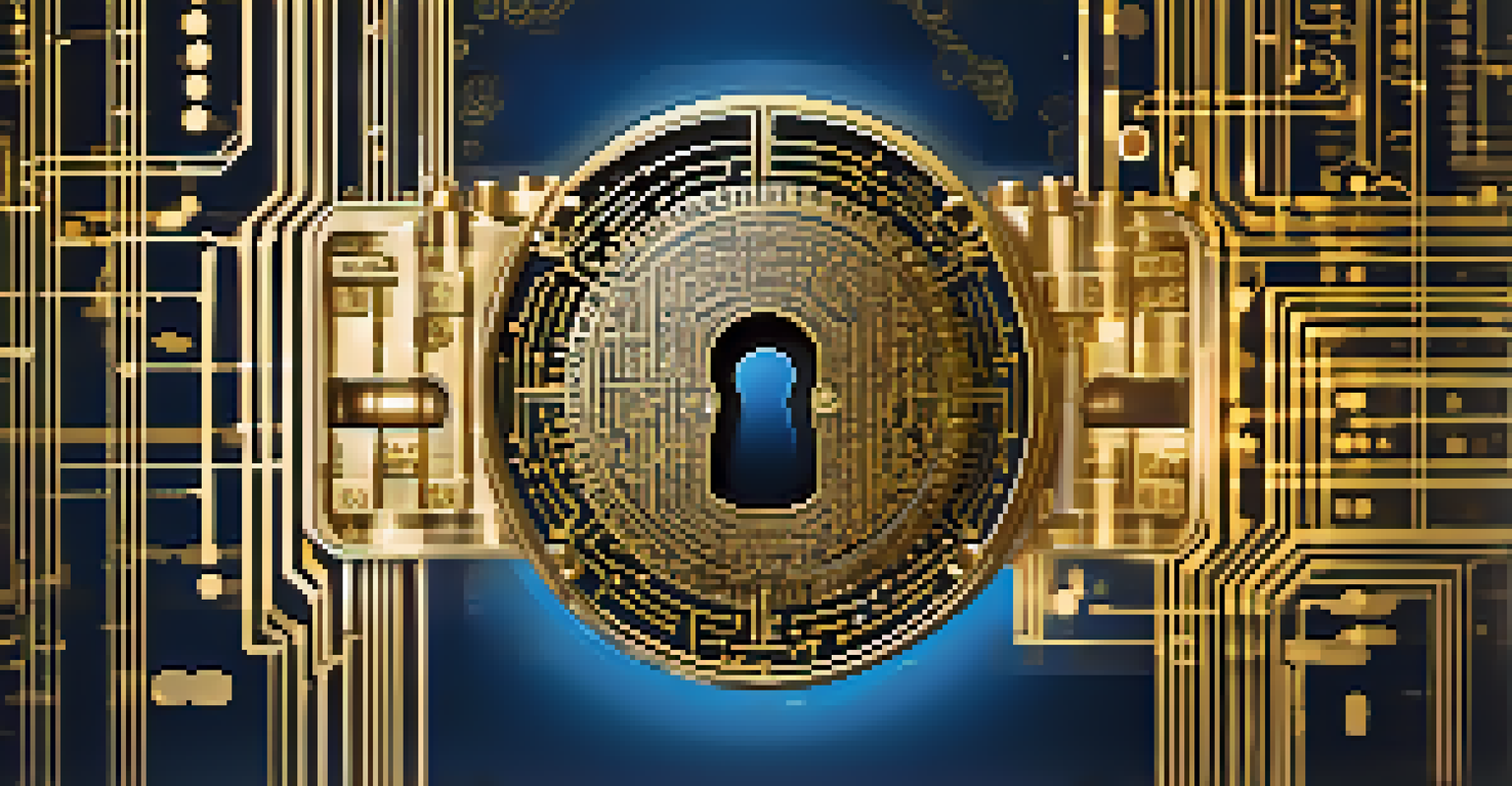Creating Secure Digital Identities Using Blockchain Solutions

Understanding Digital Identities in the Modern World
In today’s digital landscape, our identities are more than just names; they encompass personal data, online behaviors, and even our financial information. Each time we log in to a website or make a purchase online, we create a digital footprint that can be traced back to us. As our reliance on digital services grows, so does the importance of managing and protecting these identities.
The greatest danger in times of turbulence is not the turbulence; it is to act with yesterday's logic.
However, with convenience comes vulnerability. Data breaches and identity theft are rampant, prompting a pressing need for secure solutions. This is where blockchain technology steps in, offering a decentralized approach to identity management that can significantly enhance security.
By using blockchain, individuals can take control of their own digital identities, reducing the risk of unauthorized access. This shift not only empowers users but also builds trust in digital transactions, making it a vital topic in our increasingly online world.
What is Blockchain Technology?
At its core, blockchain is a distributed ledger technology that records transactions across many computers. This means that once information is entered, it cannot easily be altered or deleted, providing a high level of security and transparency. Think of it like a digital notebook that multiple people can write in, but where no one can erase what’s already been written.

Blockchain operates on the principle of decentralization, meaning no single entity has control over the entire network. This reduces the risk of a single point of failure, making it much harder for hackers to compromise the system. Instead of relying on a central authority, blockchain distributes information across a network, enhancing security.
Digital Identities Need Protection
As our digital footprint expands, managing and safeguarding our online identities becomes increasingly crucial.
By leveraging blockchain for digital identities, we can create a system where individuals manage their own information and share it securely as needed. This not only protects personal data but also streamlines the verification process for online services.
The Role of Cryptography in Blockchain Security
Cryptography is the backbone of blockchain security, ensuring that the information stored is accessible only to those who are authorized. Through techniques like hashing and encryption, sensitive data is transformed into a format that is unreadable without the proper keys. This makes it incredibly difficult for unauthorized users to access or tamper with the data.
Privacy is not an option, and it shouldn’t be the price we accept for just getting on the Internet.
For instance, when you create a digital identity on a blockchain, your personal information is encrypted and stored in a way that only you can access it. This adds an extra layer of protection, as even if someone were to gain access to the blockchain, they would still be unable to read your information without the encryption key.
By using cryptography, blockchain not only secures identities but also enhances privacy. Users can choose what information to share and with whom, giving them greater control over their digital lives.
Benefits of Using Blockchain for Digital Identities
One of the most significant benefits of using blockchain for digital identities is enhanced security. With traditional systems, a centralized database can be a target for hackers, but blockchain's decentralized nature makes it much harder to breach. This means that your personal information is less likely to be compromised.
Another advantage is the ease of verification. With blockchain, identity verification can happen in real-time without the need for intermediaries. This not only speeds up transactions but also reduces costs, as users can directly authenticate their identities without relying on third-party services.
Blockchain Enhances Identity Security
Blockchain technology offers a decentralized solution that empowers users to control their digital identities and strengthens security.
Moreover, blockchain allows for the creation of self-sovereign identities, where individuals retain full control over their data. This empowers users to share only the necessary information while keeping the rest private, offering a balance between accessibility and security.
Real-World Applications of Blockchain in Identity Management
Several organizations are already implementing blockchain solutions for identity management. For example, governments in various countries are exploring blockchain to enhance the security and efficiency of national IDs and passports. This not only reduces fraud but also streamlines the verification process for citizens.
In the private sector, companies like Microsoft are developing decentralized identity systems that allow users to manage their own credentials securely. This empowers users to share specific information without revealing their entire identity, creating a more secure online environment.
Additionally, non-profit organizations are leveraging blockchain to provide digital identities to those without access to traditional identification. This can be life-changing for individuals in underserved communities, granting them access to services and opportunities that require verified identification.
Challenges in Implementing Blockchain Solutions
Despite its potential, implementing blockchain for digital identities is not without challenges. One significant hurdle is the need for widespread adoption and interoperability across different platforms. If various systems cannot communicate with each other, the benefits of blockchain can be limited.
Additionally, there are regulatory and legal considerations to navigate. As blockchain technology evolves, so do the laws surrounding data privacy and security. Organizations must ensure compliance with these regulations while still leveraging the benefits of blockchain.
Challenges to Blockchain Adoption
Despite its advantages, implementing blockchain for identity management faces hurdles like interoperability, regulation, and user education.
Lastly, there’s the challenge of user education. Many individuals are unfamiliar with blockchain technology, which can hinder adoption. Educating users about how to manage their digital identities securely is essential for the successful implementation of these solutions.
The Future of Digital Identities with Blockchain
Looking ahead, the future of digital identities powered by blockchain appears promising. As technology continues to evolve, we can expect more innovative solutions that address current challenges while enhancing security and privacy. The ongoing development of decentralized identity frameworks will likely pave the way for a more secure digital landscape.
Moreover, as public awareness of digital security grows, individuals may become more inclined to adopt blockchain-based identity solutions. This shift could lead to greater trust in online transactions and interactions, fostering a safer internet environment.

Ultimately, the integration of blockchain into identity management has the potential to transform how we interact online, giving individuals more control over their personal information and paving the way for a new era of digital security.